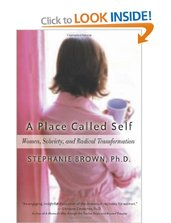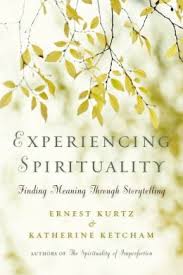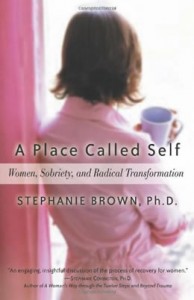A series of my blog posts based on Stephanie Brown’s wonderful book, A Place Called Self: Women, Sobriety, and Radical Transformation. In her book, Stephanie talks about what happens to women in recovery, how they think, how they feel, their problems, the good things, etc. (The book is relevant to men as well!)
What Happens to Women in Recovery: Stephanie Brown
 In the Resources section of the website, I have a series of my posts under the title Stephanie Brown on Recovery. These posts are based on Stephanie Brown’s wonderful 2004 book A Place Called Self: Women, Sobriety, and Radical Transformation. In her book, Stephanie talks about what happens to women in recovery, how they think, how they feel, their problems, the good things, etc. (The book is relevant to men as well!) Here is the main part of the first of my posts, entitled ‘What is Recovery’, according to Stephanie Brown (Part 1).
In the Resources section of the website, I have a series of my posts under the title Stephanie Brown on Recovery. These posts are based on Stephanie Brown’s wonderful 2004 book A Place Called Self: Women, Sobriety, and Radical Transformation. In her book, Stephanie talks about what happens to women in recovery, how they think, how they feel, their problems, the good things, etc. (The book is relevant to men as well!) Here is the main part of the first of my posts, entitled ‘What is Recovery’, according to Stephanie Brown (Part 1).
“‘Recovery has held so many surprises for me. Some good. Some bad. I didn’t know I could hurt so much. But I also didn’t know I could love so much and be so loved. I had no idea that recovery was also learning how to be in intimate relationships, learning how to have close, wonderful friends. Then there’s my marriage. My husband and I have developed a rich life together. And get this – I really like myself now. Learning about who I am and accepting me, that’s been the hardest part of recovery – and the best. I wouldn’t trade this path for anything in the world.’ Anne, Recoveree
‘Healing From Trauma: Owning Your Self’ by Bessel van der Kolk
 The Body Keeps the Score: Brain, Mind, and Body in the Healing of Trauma by Bessel Van Der Kolk is one of the best books I have read in a very long time. It is essential reading for anyone interested in the healing of trauma. Here’s a short excerpt:
The Body Keeps the Score: Brain, Mind, and Body in the Healing of Trauma by Bessel Van Der Kolk is one of the best books I have read in a very long time. It is essential reading for anyone interested in the healing of trauma. Here’s a short excerpt:
‘Nobody can “treat” a war, or abuse, or rape, molestation, or any other horrendous event, for that matter; what has happened cannot be undone.
But what can be dealt with are the imprints of the trauma on body, mind and soul: the crushing sensations in your chest that you may label as anxiety or depression; the fear of losing control; always being on alert for danger or rejection; the self-loathing; the nightmares and flashbacks; the fog that keeps you from staying on task and engaging fully in what you are doing; being unable to fully open your heart to another human being.
Trauma robs you of the feeling that you are in charge of yourself, of what I will call self-leadership in the chapters to come.
‘How People-Pleasing Destroys Your Authentic Self’ by Shahida Arabi
 I like this piece of writing from the Self-Care Haven, a website developed by a graduate student at Columbia University in the States.
I like this piece of writing from the Self-Care Haven, a website developed by a graduate student at Columbia University in the States.
This article is one for your self-care collection. It’s easy to start people pleasing in recovery, particularly when you are worried about stigma in society.
‘ARE YOU A PEOPLE-PLEASER?
Symptoms include but are not limited to: saying yes when you really mean no, allowing people to trample all over your boundaries on a weekly basis without asserting yourself, and “performing” character traits or behaviors that do not speak to your authentic self.
Can cause high blood pressure and stewing resentment that festers for years until the “last straw,” at which point, sounds of an explosion erupt. You’re so tired of being Jekyll all the time you become the worst version of Hyde possible to let out all the steam that was simmering within all along.
‘Are you recovered or recovering?’ by Veronica Valli
 Here’s a great piece from one of my favourite bloggers.
Here’s a great piece from one of my favourite bloggers.
‘It’s time to address a somewhat contentious issue in recovery circles. The matter of being either a ‘Recovered alcoholic/addict’ or a ‘Recovering alcoholic/addict.’
I am a recovered alcoholic and have considered myself one for many years. Let me explain why.
If you have read my book or read any of the posts on my blog, you will know that I predominantly believe that alcoholism is a manifestation of a spiritual condition. Alcoholism is not caused by external factors although they most definitely contribute.
‘Experiencing Recovery – Part 4′ by William L. White: Frameworks of Recovery
In this part of his talk, Bill White discusses the degrees/depths of recovery. He describes how some better people feel ‘better than well’ after recovery.
He goes on to describe different types of recovery initiation/maintenance framework and different styles of recovery.
Addiction and trust: Marc Lewis at TEDxRadboudU 2013
A former drug addict himself, Lewis now researches addiction. In order to get over ones addiction, he explains, self-trust is necessary.
Unfortunately, self-trust is extremely difficult for an addict to achieve. There are two factors that make it so difficult to get over an addiction: lack of self-control and an inability to put off reward. An addict wants his fix and he wants it now, despite the risk of losing out on a happier, healthier future.
The way to build self-trust, Lewis explained, and get over an addiction is for the addict to begin an internal dialogue with his future self to convince his present self that it can, in fact, live without its addiction.
‘Spirituality and Recovery’ by Bill White
 A new book, Experiencing Spirituality, co-authored by Ernest Kurtz and Katherine Ketcham, has just been released. It will find a broad and appreciative audience and will be of particular interest to addiction professionals, recovery support specialists, and people in recovery.
A new book, Experiencing Spirituality, co-authored by Ernest Kurtz and Katherine Ketcham, has just been released. It will find a broad and appreciative audience and will be of particular interest to addiction professionals, recovery support specialists, and people in recovery.
It is not a treatise on how to recover, but it offers profound insights about how to live one’s life in recovery. Brilliantly conceived and beautifully written, Experiencing Spirituality is one of those rare books readers will return to again and again as a balm for old and fresh wounds and as a meditation on how to live a life of greater balance, fulfillment, and self-acceptance.
Kurtz is best known to readers of this site for his classic text, Not-God: A History of Alcoholics Anonymous, Ketcham for her co-authorship of Under the Influence and Beyond the Influence.
In 1992, Kurtz and Ketcham co-authored The Spirituality of Imperfection, which used classic stories to explore the spiritual legacies of Alcoholics Anonymous. The Spirituality of Imperfection is one of my all-time favorite books.
‘Shedding Skins in Recovery’ by William L White
 More wonderful reflections from Bill White in his latest blog posting.
More wonderful reflections from Bill White in his latest blog posting.
‘For years, the following quote has rested over my writing desk: “The Phoenix does not mourn what lies in its ashes; the serpent does not mourn its old skin.” Arthur Frank
Addiction recovery involves a progressive unpeeling of the self and focused efforts of self-construction. It is helpful in thinking of this to distinguish between remission and recovery.
Remission of an illness can involve little more than the removal of symptoms and a return to the earlier trajectory of one’s existence. In this sense, remission is regressive – a return to an earlier level of functioning.
New Resource: Stephanie Brown on Recovery
 I’ve added the following to the Resources section.
I’ve added the following to the Resources section.
‘These blogs are based on Stephanie Brown’s wonderful book, A Place Called Self: Women, Sobriety, and Radical Transformation. In her book, Stephanie talks about what happens to women in recovery, how they think, how they feel, their problems, the good things, etc. (The book is relevant to men as well!)
What is Recovery? (Part 1)
“Recovery has held so many surprises for me. Some good. Some bad. I didn’t know I could hurt so much. But I also didn’t know I could love so much and be so loved.”
‘The Masks of Addiction and Recovery’ by Bill White
 There is a discrepancy for each of us between the internal self and the personas we project to others. Personal health, wholeness and integrity hinge in great measure on the degree to which these private and public selves can be brought into harmony. That reconciliation is potentially life-saving for persons seeking the metamorphosis from active addiction to long-term recovery.
There is a discrepancy for each of us between the internal self and the personas we project to others. Personal health, wholeness and integrity hinge in great measure on the degree to which these private and public selves can be brought into harmony. That reconciliation is potentially life-saving for persons seeking the metamorphosis from active addiction to long-term recovery.
It is a unique medical disorder whose effective management requires living as authentically and honestly as possible, and yet it is that precise aspect that leaves many people viewing addiction recovery as a priceless gift that far transcends freedom from destructive drug use.
What makes this journey towards authenticity so much more hazardous within addiction recovery compared to the parallel journey for others is the degree of duplicity at the very heart of the addiction experience. Addiction hollows one out, leaving only the mask of the moment. With every repetition of use, the drug becomes more powerful and the self becomes weaker, its boundaries and internal substance fading, leaving only accumulating secrets in its wake.
20 Things to Start Doing in Your Relationships
 Relationships are key in recovery. So let’s look at some things that will facilitate healthy relationships, from Marc and Angel Hack Life.
Relationships are key in recovery. So let’s look at some things that will facilitate healthy relationships, from Marc and Angel Hack Life.
‘Family isn’t always blood. They’re the people in your life who appreciate having you in theirs – the ones who encourage you to improve in healthy and exciting ways, and who not only embrace who you are now, but also embrace and embody who you want to be. These people – your real family – are the ones who truly matter.
Here are twenty tips to help you find and foster these special relationships.
1. Free yourself from negative people. Spend time with nice people who are smart, driven and likeminded. Relationships should help you, not hurt you. Surround yourself with people who reflect the person you want to be. Choose friends who you are proud to know, people you admire, who love and respect you – people who make your day a little brighter simply by being in it.
Journeys into and out of Heroin Addiction, Part 3: Trying to Stop
 The decision to stop using drugs is fundamental to the process of recovery from addiction. It is the initial part of the process by which people overcome a drug addiction.
The decision to stop using drugs is fundamental to the process of recovery from addiction. It is the initial part of the process by which people overcome a drug addiction.
However, whilst making the decision to quit is of great importance, it does not follow that the person will in fact stop using and maintain this abstinence for a prolonged period or indefinitely. There are a wide variety of factors that influence ‘stopping’ and ‘staying stopped’.
In looking at a person’s decision to stop using heroin, we must consider the external reality and circumstances of their life, as well as the internal thought processes that occur when they make the decision to stop.
“What is Recovery?” according to Stephanie Brown (Part 3)
 In A Place Called Self, Stephanie Brown emphasises that in recovery a woman transforms the way she thinks about herself, as well as the way she thinks about life itself. She points out two common myths about recovery, the first of which I’ll discuss here: ‘Recovery is moving from bad to good.’
In A Place Called Self, Stephanie Brown emphasises that in recovery a woman transforms the way she thinks about herself, as well as the way she thinks about life itself. She points out two common myths about recovery, the first of which I’ll discuss here: ‘Recovery is moving from bad to good.’
Many women think that being addicted is evidence of ‘shameful neediness, of deep and lasting failures.’ Many addicted women are trying to do their best, to be a good mother, wife and friend, yet they feel bad. They believe themselves to be a bad person.
“What is Recovery?” according to Stephanie Brown (Part 2)
 In an earlier blog, I referred to Stephanie Brown’s book A Place Called Self, in which she describes recovery as radical change in personal identity, or the self. Stephanie goes on to emphasise a number of myths about recovery.
In an earlier blog, I referred to Stephanie Brown’s book A Place Called Self, in which she describes recovery as radical change in personal identity, or the self. Stephanie goes on to emphasise a number of myths about recovery.
Firstly, the dictionary definition of recovery states ‘a return to a normal condition.’ This would suggest that in addiction recovery the person goes back to where they were before they became addicted. In fact, this is rarely the case. Stephanie emphasises that recovery is more like a starting over than a restoration of what was lost during addiction. This is because for many people the real self was never really developed.
‘What is Recovery?’ according to Stephanie Brown (Part 1)
 ‘Recovery has held so many surprises for me. Some good. Some bad. I didn’t know I could hurt so much. But I also didn’t know I could love so much and be so loved. I had no idea that recovery was also learning how to be in intimate relationships, learning how to have close, wonderful friends. Then there’s my marriage. My husband and I have developed a rich life together. And get this – I really like myself now. Learning about who I am and accepting me, that’s been the hardest part of recovery – and the best. I wouldn’t trade this path for anything in the world.’ Anne, Recoveree
‘Recovery has held so many surprises for me. Some good. Some bad. I didn’t know I could hurt so much. But I also didn’t know I could love so much and be so loved. I had no idea that recovery was also learning how to be in intimate relationships, learning how to have close, wonderful friends. Then there’s my marriage. My husband and I have developed a rich life together. And get this – I really like myself now. Learning about who I am and accepting me, that’s been the hardest part of recovery – and the best. I wouldn’t trade this path for anything in the world.’ Anne, Recoveree
This quote comes from the most wonderful book, A Place Called Self: Women, Sobriety, and Radical Transformation. Stephanie Brown’s book talks about what happens to women in recovery, how they think, how they feel, their problems, the good things, etc. (And before you ask, the book is relevant to men as well!)
Stephanie Brown describes recovery as a journey, a process. It is a radical change in personal identity (or the self). See the words drugs and alcohol there. Nup! You can recover from all sorts of things, like mental mental health problems, loss of a loved one, trauma, etc.

 People with serious substance use problems lose a lot of the roles or personal characteristics that help define their normal identity (e.g. loving son, athlete, generosity, intelligence) as their dependence on their substance(s) increases, relationships wither and isolation increases. Eventually, their identity as viewed by others may become ‘a useless, dirty addict’. They will also have personal views of what they have become and these views can lead to lowered self-esteem or even intense hatred of oneself.
People with serious substance use problems lose a lot of the roles or personal characteristics that help define their normal identity (e.g. loving son, athlete, generosity, intelligence) as their dependence on their substance(s) increases, relationships wither and isolation increases. Eventually, their identity as viewed by others may become ‘a useless, dirty addict’. They will also have personal views of what they have become and these views can lead to lowered self-esteem or even intense hatred of oneself.


